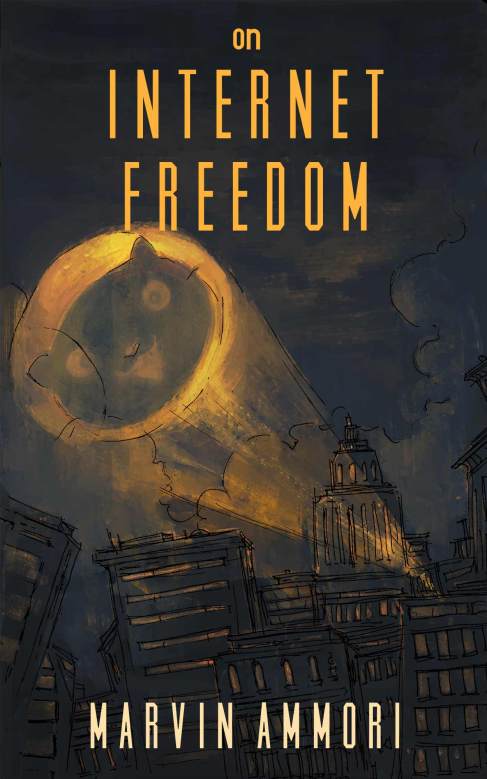Marvin Ammori: On Internet Freedom (2013)
Filed under book | Tags: · free speech, internet, law, net neutrality

Every few years, a new book comes out explaining that the future of the Internet is at risk. And every few years, it really is. This book explains why.
In this important new work, On Internet Freedom, leading advocate and First Amendment scholar Marvin Ammori explores why the Internet is continually under threat, what’s at stake in the battle for Internet freedom, and how Internet users can rise up to protect their rights. Written for average Internet users, not just for lawyers and technologists, this book explains these issues and their significance for anyone who has ever sent an email.
Proceeds from this book will be donated to Fight for the Future and Demand Progress.
Publisher Elkat Books, January 2013
PDF (MOBI)
PDF (EPUB, added on 2013-2-5)
Andrew Blum: Tubes: A Journey to the Center of the Internet (2012)
Filed under book | Tags: · internet, media archeology, media infrastructure, network archeology, networks

When your Internet cable leaves your living room, where does it go? Almost everything about our day-to-day lives—and the broader scheme of human culture—can be found on the Internet. But what is it physically? And where is it really? Our mental map of the network is as blank as the map of the ocean that Columbus carried on his first Atlantic voyage. The Internet, its material nuts and bolts, is an unexplored territory. Until now.
In Tubes, journalist Andrew Blum goes inside the Internet’s physical infrastructure and flips on the lights, revealing an utterly fresh look at the online world we think we know. It is a shockingly tactile realm of unmarked compounds, populated by a special caste of engineer who pieces together our networks by hand; where glass fibers pulse with light and creaky telegraph buildings, tortuously rewired, become communication hubs once again. From the room in Los Angeles where the Internet first flickered to life to the caverns beneath Manhattan where new fiber-optic cable is buried; from the coast of Portugal, where a ten-thousand-mile undersea cable just two thumbs wide connects Europe and Africa, to the wilds of the Pacific Northwest, where Google, Microsoft, and Facebook have built monumental data centers—Blum chronicles the dramatic story of the Internet’s development, explains how it all works, and takes the first-ever in-depth look inside its hidden monuments.
This is a book about real places on the map: their sounds and smells, their storied pasts, their physical details, and the people who live there. For all the talk of the “placelessness” of our digital age, the Internet is as fixed in real, physical spaces as the railroad or telephone. You can map it and touch it, and you can visit it. Is the Internet in fact “a series of tubes” as Ted Stevens, the late senator from Alaska, once famously described it? How can we know the Internet’s possibilities if we don’t know its parts?
Like Tracy Kidder’s classic The Soul of a New Machine or Tom Vanderbilt’s recent bestseller Traffic, Tubes combines on-the-ground reporting and lucid explanation into an engaging, mind-bending narrative to help us understand the physical world that underlies our digital lives.
Publisher Ecco, an imprint of HarperCollins, 2012
ISBN 1443414395, 9781443414395
304 pages
review (Dwight Garner, The New York Times)
review (Iain Morris, The Guardian)
Infrastructural Tourism (commentary, Shannon Mattern, Words in Space blog)
Download (removed on 2013-1-15 upon request of the author)
Comment (0)Alexander Halavais: Search Engine Society (2008–)
Filed under book | Tags: · attention, attention economy, censorship, democracy, facebook, google, internet, knowledge, pagerank, privacy, search, web

“Search engines have become a key part of our everyday lives. Yet while much has been written about how to use search engines and how they can be improved, there has been comparatively little exploration of what the social and cultural effects might be. Like all technologies, search engines exist within a larger political, cultural, and economic environment. This volume aims to redress this balance and to address crucial questions such as:
* How have search engines changed the way we organize our thoughts about the world, and how we work?
* What are the ‘search engine wars’, what do they portend for the future of search, and who wins or loses?
* To what extent does political control of search engines, or the political influence of search engines, affect how they are used, misused, and regulated?
* Does the search engine help shape our identities and interactions with others, and what implications does this have for privacy?
Informed members of the information society must understand the social contexts in which search engines have been developed, what that development says about us as a society, and the role of the search engine in the global information environment. This book provides the perfect starting point.”
Publisher Polity, 2008
Digital Media and Society series
ISBN 0745642152, 9780745642154
196 pages
PDF (updated on 2019-12-5)
EPUB (2nd ed., 2017, added on 2019-12-5)

